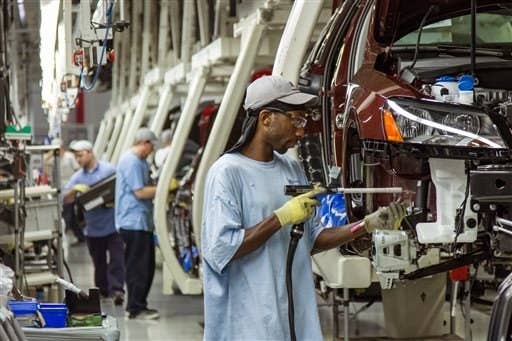
Corporate newsrooms flooded Iowa with reporters over the weekend to follow the Democratic primary circus taking place there. But in Tennessee this week, I saw only one national news outlet, Reuters, show up to cover perhaps the most consequential election taking place in the South this year.
What’s at stake is bigger than a seat in Congress or a handful of primary delegates: It’s the possibility that the labor movement could finally make a historic breakthrough in the heart of the anti-union South, changing the trajectory of working-class power in the process.
From today until Friday, 1,700 workers at a Volkswagen factory here in Chattanooga will be voting on whether or not they want to join the United Auto Workers union. Five years ago, workers at the plant voted down the union 727–626. Many who voted against the union back then say they’ll vote in favor now, after seeing Volkswagen break promise after promise.
If they prevail, it will mark the first time the UAW has successfully unionized a foreign-owned auto plant in the South, after more than three decades of trying. It would likely persuade cautious labor leaders to invest big in organizing the rapidly growing South, which has seen a boost in union support following a series of wildcat teachers’ strikes that inspired the nation last year.
Those strikes received glowing national media coverage — a rarity for the labor movement, where strikes and industrial action are typically overlooked by the press. That’s certainly the case with this week’s union election here, and Volkswagen, as well as outside groups like the anti-union Center for Union Facts and Southern Momentum, are filling the void left by the lack of coverage. They are spending hundreds of thousands of dollars to attack the UAW, running ads warning workers that unions could destroy their auto plant and make their jobs disappear.
With little coverage of the vote in the mainstream media, it means that the UAW is being defined mostly by anti-union forces. It’s a particularly unfortunate development, given how the media’s positive portrayal of the teachers’ strikes sparked such a wave of union interest across Tennessee and the South.
“The media coverage of the strikes represented a break from the past because journalists and editors quickly realized the strikes were far more than just a string of industrial actions,” says American Federation of Teachers President Randi Weingarten. “They were about our core values as a nation.”
Striking teachers raised fundamental questions about American education that drove the positive coverage. Does every child deserve a good education, whether or not they live in a wealthy neighborhood? Are public schools centerpieces of local communities? “Those questions deserved to be on the front page,” Weingarten said. “And that created more momentum for the strikes themselves.”
Similar spikes in national attention and support have played a crucial role in the organizing drive that has unionized at least three dozen digital media outlets in recent years. So you would think that somewhere, in the very online and very unionized national media, there would be a few editors motivated to send a reporter to cover a historic and hugely consequential union vote in Tennessee?
But instead, outlets are spending tens of thousands of dollars following the long-shot presidential bid of Beto O'Rourke as he ambles around the early primary states.
I covered the first union vote at Chattanooga five years ago, and lived there while working on a book about the nearly decadelong struggle. This time around, I couldn’t find a single outlet interested in covering the story. Luckily, I was able to raise the money directly from readers, who are more interested in the story of working-class organizing than the national outlets realize.
I was only able to do that because as a freelancer, I had created my own small crowdfunded outlet, Payday Report, after being fired during a union drive at Politico back in 2015. In three years, we have raised $100,000 directly from readers to cover stories of the labor movement that nobody else is doing.
We were the first national outlet to cover the news of the brewing West Virginia teachers’ strike back in December 2017. Thanks to reader donations, we were one of a handful of outlets with a reporter on the ground in all five states with teachers’ strike last year: West Virginia, Oklahoma, Arizona, North Carolina, and Kentucky. The lesson for us has been that people want to read about labor organizing because it's inspiring — and they will pay good money for it.
(You can contribute to our reporting fund here — so far, we’ve raised $2,000 towards our $3,000 goal to cover this election.)
Publications like Payday are the future of journalism. They need little investment to launch: just a movement of readers to actively promote them. At a time when many in the media blame Google and Facebook for killing ad revenue, crowdfunded publications show that the direct relationship between readers and reporters in the social media age is the most sustainable way to save journalism — and to keep it focused on the things readers value the most.
It’s time for reporters to act on the lessons of the union drives that organized so many newsrooms in the last few years. If we want a press that is going to cover the working class, we are going to have to build it ourselves.
Mike Elk is a Sidney Award–winning labor reporter and the founder of PaydayReport.com. He can be reached at melk@paydayreport.com.
